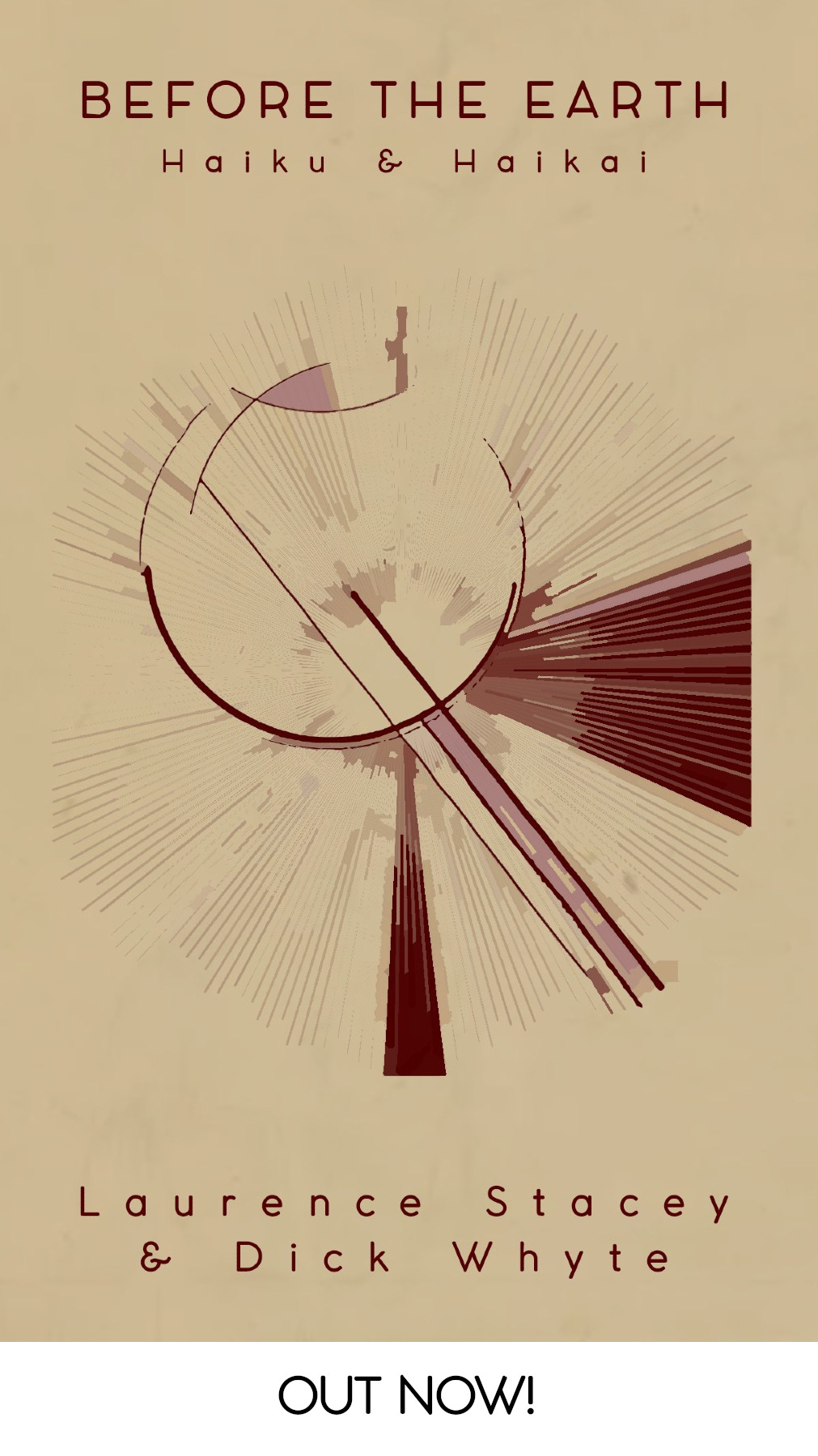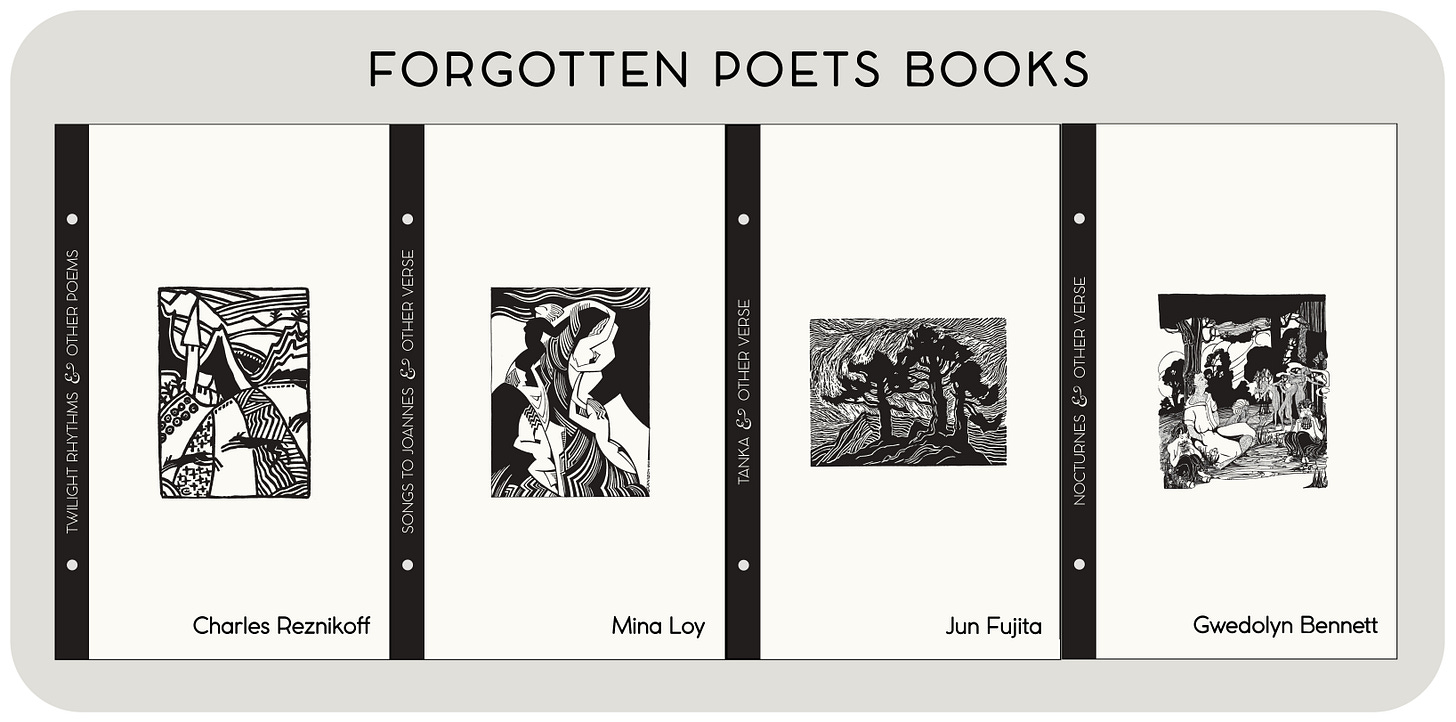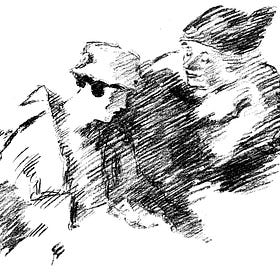—: From 'Songs Of Deliverance' (1914) :— This is the song of youth, This is the cause of myself; I knew my father well and he was a fool, Therefore will I have my own foot in the path before I take a step; I will go only into new lands, And I will walk on no plank-walks. The horses of my family are wind-broken, And the dogs are old, And the guns rusty; I will make me a new bow from an ash-tree, And cut up the homestead into arrows . . . I have no time to wait for them to build bridges for me; Where awful the gap seems stretching there is no gap, Leaping I take it at once from a thought to a thought.
—: Blue Undershirts (1915) :— Blue undershirts, Upon a line, It is not necessary to say to you Anything about it— What they do, What they might do . . . blue undershirts.
—: Somewhere (1915) :—
Now I know
I have been eating apple-pie for breakfast
In the New England
Of your sexuality.
—: At the Door (1915) :— I have only a tingling remembrance Not of his eyes But of A dandelion . . . Nevertheless, The whole of him, The whole of me, There— Known, elicited, understood.
—: The Little Flowers (1917) :— I am not smiling Beside this mound For a long time now I have forgotten to smile At the wrecked and beaten ruin Of so many a proud-facaded thought . . . But I watch the little flowers Growing from it Gravely I watch the little indomitable flowers Putting their heads up. Thrusting out their fingers to the sun.
—: Poet and Planter (1923) :— Growing leaves are best for books, Libraries are something dead; Leaf of corn and leaf of rye!— To be cooked, not read! Here is print; the seeds that fall, They make prose of finer gold.— Print that is not black and small May go wet and mold! Fool, the poems of the earth Come with every spring afresh!— Harvest's eaten . . . what's the worth? More unlovely flesh?
Orrick Johns (1887-1946) was; “Born in St. Louis, Missouri. Educated at the University of Missouri and Washington University in St. Louis. Was associated for a short time with Reedy's Mirror, as a dramatic critic and book reviewer. In 1912 received first prize for a poem entitled 'Second Avenue' [inspired by a speech by anarchist Emma Goldman] in The Lyric Year, and was afterwards published in that volume.” (The Second Book of Modern Verse, 1920)
Moved to Greenwich Village from 1913-15 where he was known as one of the ‘Lyrical Left’, and was one of the earliest free-verse poets of the post-1913 “new poetry” movement. Also spent time at Man Ray’s artist colony ‘Grantwood’, in New Jersey, where Alfred Kreymborg established the ‘Others’ poetry group, including Marianne Moore, William Carlos Williams, Conrad Aiken, Lola Ridge, Djuna Barnes, Fenton Johnson, and many others. Johns went on to publish three books of poetry, Asphalt (1917), Black Branches (1920), and Wild Plum (1926), as well a novel, Blindfold (1925), and numerous plays.
After living in Italy for a few years Johns returned to America, and in the 1930s became increasingly active in politics, working with labour organisations and as an editor for The Daily Worker and The New Masses, both popular American Marxist magazines. Despite his many successes, Johns clearly struggled mentally, and in 1946 sadly took his own life at the age of 59.
Illustration by William Gropper (The New Masses, Dec. 1926).
—: After Orrick Johns :— [for B.] by Dick Whyte indelible—like that plate of chopped fruit forgotten in our excitement, knocked off the dresser & onto the floor— a reminder futures are not known but anticipated antecedents—animals rushing to the waterhole, each making room for the other— exhausted & satisfied—the way dirt is satisfied by rain as it turns to mud & later dries out in the sun— emboldened
Forgotten Poets Presents:
Forgotten Poems, a living anthology of obscure and out-of-print poetry from the late-1800s and early-1900s. Explore the archives:
Florence Kiper Frank - The Kiss (1915)
—: The Kiss :— Sheer joy of youth and madness of the moon And all the illimitable longings of my blood Leapt in me. I was half mad with the sweet Delirious feel of living. It was then I caught her eyes upon me...
Helene Johnson - 4 Short Poems (1925-26)
—: Trees At Night :— Slim sentinels Stretching lacy arms About a slumbrous moon; Black quivering Silhouettes, Tremulous, Stencilled on the petal Of a bluebell; Ink spluttered On a robin’s breast...
More poems about flowers . . .
André Derain - 9 Woodcuts (1919-1925)
André Derain (1880-1954) was born just outside Paris, and is primarily known as a painter. Derain was close with Matisse, and together they were a part of the Fauvist movement, known for its bold use of colour and heavy brush-strokes...
Kenneth Haney - What A Poem Is (1928)
—: What A Poem Is :— A poem is a word, that unfolds its strange and hidden meanings only to those that know the touch of warm moist earth about its roots? A poem is a sound, faint and distant...
More from the Book Of Lost Rhymes . . .
Anne Spencer - 5 Short Poems (1920-1975)
—: Dunbar (1920) :— Ah, how poets sing and die! Make one song and heaven takes it: Have one heart and beauty breaks it: Chatterton, Shelly, Keats, and I— Ah, how poets sing and die...
















Quenching & lovely & bittersweet. Thank you, Dick 💛
Blue Undershirts reads like something that could have been part of a postmodern poetry collection, today.
Your poem says a lot with few lines. Love the adjectives you use for mud.